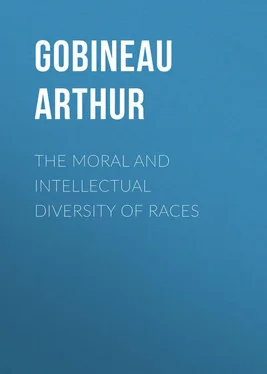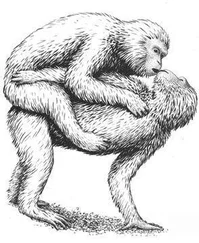Arthur Gobineau - The Moral and Intellectual Diversity of Races
Здесь есть возможность читать онлайн «Arthur Gobineau - The Moral and Intellectual Diversity of Races» — ознакомительный отрывок электронной книги совершенно бесплатно, а после прочтения отрывка купить полную версию. В некоторых случаях можно слушать аудио, скачать через торрент в формате fb2 и присутствует краткое содержание. Жанр: История, foreign_antique, foreign_prose, на английском языке. Описание произведения, (предисловие) а так же отзывы посетителей доступны на портале библиотеки ЛибКат.
- Название:The Moral and Intellectual Diversity of Races
- Автор:
- Жанр:
- Год:неизвестен
- ISBN:нет данных
- Рейтинг книги:4 / 5. Голосов: 1
-
Избранное:Добавить в избранное
- Отзывы:
-
Ваша оценка:
- 80
- 1
- 2
- 3
- 4
- 5
The Moral and Intellectual Diversity of Races: краткое содержание, описание и аннотация
Предлагаем к чтению аннотацию, описание, краткое содержание или предисловие (зависит от того, что написал сам автор книги «The Moral and Intellectual Diversity of Races»). Если вы не нашли необходимую информацию о книге — напишите в комментариях, мы постараемся отыскать её.
The Moral and Intellectual Diversity of Races — читать онлайн ознакомительный отрывок
Ниже представлен текст книги, разбитый по страницам. Система сохранения места последней прочитанной страницы, позволяет с удобством читать онлайн бесплатно книгу «The Moral and Intellectual Diversity of Races», без необходимости каждый раз заново искать на чём Вы остановились. Поставьте закладку, и сможете в любой момент перейти на страницу, на которой закончили чтение.
Интервал:
Закладка:
Even the historians of ancient Greece wondered at those gigantic ruins, of which many are still extant. Of these cyclopean remains, as they were often called, no one knew the builders or the history, and they were considered as the labors of the fabulous heroes of a traditional epoch. For an account of these memorials of an ante-hellenic civilization in Greece, of which we have no record , particularly the ruins of Orchomonos, Tirgus, Mycene, and the tunnels of Lake Copais, see Niebuhr's Ancient History , vol. i. p. 241, et passim .
24
Democracy in America, vol. ii. ch. xviii. p. 424.
25
Daniel ii. 44.
26
Daniel ii. 31 to 35.
27
Among many passages illustrative of the ultra utilitarianism of the Chinese, I can find space but for one, and that selected almost at random. After speaking of the exemplary diffusion of primary instruction among the masses, he says that, though they all read, and frequently, yet even their reading is of a strictly utilitarian character, and never answers any but practical purposes or temporary amusement. The name of the author is seldom known, and never inquired after. "That class are, in their eyes, only idle persons, who pass their time in making prose or verse. They have no objection to such a pursuit. A man may, they say, 'amuse himself with his pen as with his kite, if he likes it as well – it is all a matter of taste.' The inhabitants of the celestial empire would never recover from their astonishment if they knew to what extent intellectual labor may be in Europe a source of honor and often wealth. If they were told that a person among us may obtain great glory by composing a drama or a novel, they would either not believe it, or set it down as an additional proof of our well-known want of common sense. How would it be if they should be told of the renown of a dancer or a violin player, and that one cannot make a bound, nor the other draw a bow anywhere without thousands of newspapers hastening to spread the important news over all the kingdoms of Europe!
"The Chinese are too decided utilitarians to enter into our views of the arts. In their opinion, a man is only worthy of the admiration of his fellow-creatures when he has well fulfilled the social duties, and especially if he knows better than any one else how to get out of a scrape. You are regarded as a man of genius if you know how to regulate your family, make your lands fruitful, traffic with ability, and realize great profits. This, at least, is the only kind of genius that is of any value in the eyes of these eminently practical men." — Voyages en Chine , par M. Huc, Amer. trans., vol. i. pp. 316 and 317.
28
Nat. Hist. of the Varieties of Man. London.
29
A. de Humboldt, Examen Critique de l'Histoire de la Géographie du Nouveau Continent. Paris.
30
Amadée Thierry, La Gaule sous l'Administration Romaine , vol. i. p. 244.
31
See Prescott's History of the Conquest of Mexico .
32
C. F. Weber, M. A. Lucani Pharsalia . Leipzig, 1828, vol. i. pp. 122-123, note .
33
Prichard, Natural History of Man . – Dr. Martius is still more explicit. (See Martius and Spix , Reise in Brasilien . Munich, vol. i. pp. 379-380.)
Mr. Gobineau quotes from M. Roulin's French translation of Prichard's great work, and as I could not always find the corresponding pages in the original, I have sometimes been obliged to omit the citation of the page, that in the French translation being useless to English readers. — Transl.
34
I greatly doubt whether the fanaticism of even the ancient Mexicans could exceed that displayed by some of our not very remote ancestors. Who, that reads the trials for witchcraft in the judicial records of Scotland, and, after smiling at the frivolous, inconsistent testimony against the accused, comes to the cool, uncommented marginal note of the reporter: "Convicta et combusta," does not feel his heart leap for horror? But, if he comes to an entry like the following, he feels as though lightning from heaven could but inflict too mild a punishment on the perpetrators of such unnatural crimes.
"1608, Dec. 1. – The Earl of Mar declared to the council, that some women were taken in Broughton as witches, and being put to an assize, and convicted, albeit they persevered constant in their denial to the end, they were burnt quick (alive), after such a cruel manner, that some of them died in despair, renouncing and blaspheming God; and others, half-burned, brak out of the fire, and were cast in it again, till they were burned to death ." Entry in Sir Thomas Hamilton's Minutes of Proceedings in the Privy Council . (From W. Scott's Letters on Demonology and Witchcraft , p. 315.)
Really, I do not believe that the Peruvians ever carried fanaticism so far. Yet, a counterpart to this horrible picture is found in the history of New England. A man, named Cory, being accused of witchcraft, and refusing to plead, was accordingly pressed to death. And when, in the agony of death, the unfortunate man thrust out his tongue, the sheriff, without the least emotion, crammed it back into the mouth with his cane. (See Cotton Mather's Magnalia Christi Americana , Hardford. Thau. Pneu , c. vii. p. 383, et passim .)
Did the ferocity of the most brutish savages ever invent any torture more excruciating than that in use in the British Isles, not much more than two centuries ago, for bringing poor, decrepit old women to the confession of a crime which never existed but in the crazed brain of bigots. "The nails were torn from the fingers with smith's pincers; pins driven into the places which the nails defended; the knees were crushed in the boots , the finger-bones splintered in the pilniewinks ," etc. (Scott, op. cit. , p. 312.) But then, it is true, they had a more gentle torture, which an English Lord (Eglington) had the honor and humanity to invent! This consisted in placing the legs of a poor woman in the stocks, and then loading the bare shins with bars of iron . Above thirty stones of iron were placed upon the limbs of an unfortunate woman before she could be brought to the confession which led her to the stake. (Scott, op. cit. , pp. 321, 324, 327, etc. etc.)
As late as 1682, not yet 200 years ago, three women were hanged, in England, for witchcraft; and the fatal statute against it was not abolished until 1751, when the rabble put to death, in the most horrible manner, an old pauper woman, and very nearly killed another.
And, in the middle of last century, eighty-five persons were burnt, or otherwise executed, for witchcraft, at Mohra, in Sweden. Among them were fifteen young children.
If God had ordained that fanaticism should be punished by national ruin, were not these crimes, in which, in most cases, the whole nation participated, were not they horrible enough to draw upon the perpetrators the fate of Sodom and Gomorrah? Surely, if fanaticism were the cause of national decay, most European nations had long since been swept from the face of the globe, "so that their places could nowhere be found." – H.
35
There seem, at first sight, to be exceptions to the truth of the assertion, that luxury, in itself, is not productive of national ruin. Venice, Genoa, Pisa, etc., were aristocratic republics, in which, as in monarchies, a high degree of luxury is not only compatible with, but may even be greatly conducive to the prosperity of the state. But the basis of a democratic republic is a more or less perfect equality among its citizens, which is often impaired, and, in the end, subverted by too great a disparity of wealth. Yet, even in them, glaring contrasts between extravagant luxury and abject poverty are rather the sign than the cause, of the disappearance of democratic principles. Examples might be adduced from history, of democracies in which great wealth did not destroy democratic ideas and a consequent simplicity of manners. These ideas must first be forgotten, before wealth can produce luxury, and luxury its attendant train of evils. Though accelerating the downfall of a democratic republic, it is therefore not the primary cause of that downfall. – H.
Читать дальшеИнтервал:
Закладка:
Похожие книги на «The Moral and Intellectual Diversity of Races»
Представляем Вашему вниманию похожие книги на «The Moral and Intellectual Diversity of Races» списком для выбора. Мы отобрали схожую по названию и смыслу литературу в надежде предоставить читателям больше вариантов отыскать новые, интересные, ещё непрочитанные произведения.
Обсуждение, отзывы о книге «The Moral and Intellectual Diversity of Races» и просто собственные мнения читателей. Оставьте ваши комментарии, напишите, что Вы думаете о произведении, его смысле или главных героях. Укажите что конкретно понравилось, а что нет, и почему Вы так считаете.












